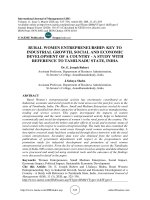Economic growth and economic development 239
Bạn đang xem bản rút gọn của tài liệu. Xem và tải ngay bản đầy đủ của tài liệu tại đây (132.75 KB, 1 trang )
Introduction to Modern Economic Growth
sure that total income in the economy is equal to the value of the endowments. The
third set of constraints requires that all prices are nonnegative.
Now compare the above maximization problem to the following problem:
max
X
ai (p) + b (p) y
i∈H
subject to the same set of constraints. The only difference between the two problems
is that in the latter each household has been assigned the same weight.
Let (p∗ , y ∗ ) be a solution to the second problem. By definition it is also a solution
to the first problem with αi = α, and therefore it is Pareto optimal, which establishes
the first part of the theorem.
To establish the second part, suppose that ai (p) = ai for all p and all i ∈ H. To
∗∗
obtain a contradiction, let y ∈R|H| and suppose that (p∗∗
α , yα ) is a solution to the
first problem for some weights {αi }i∈H and suppose that it is not a solution to the
second problem. Let
αM = max αi
i∈H
and
HM = {i ∈ H |αi = αM }
be the set of households given the maximum Pareto weight. Let (p∗ , y ∗ ) be a solution
to the second problem such that
/ H.
y i = 0 for all i ∈
(5.7)
Note that such a solution exists since the objective function and the constraint set
P
in the second problem depend only on the vector (y 1 , .., y |H| ) through y = i∈H y i .
∗∗
Since, by definition, (p∗∗
α , yα ) is in the constraint set of the second problem and
is not a solution, we have
X
i∈H
ai + b (p∗ ) y ∗ >
X
∗∗
ai + b (p∗∗
α ) yα
i∈H
∗∗
b (p∗ ) y ∗ > b (p∗∗
α ) yα .
225









